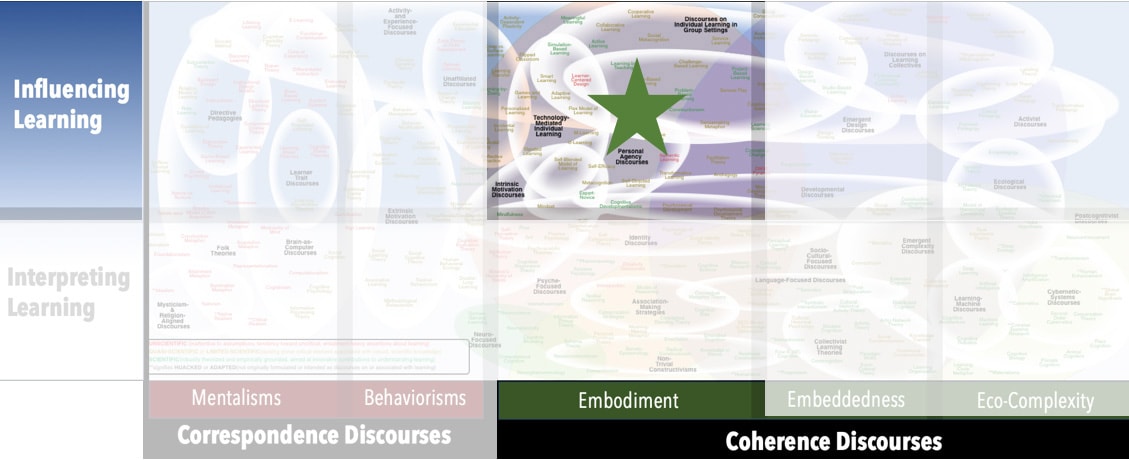Focus
Socially based activities that support engaged, impactful learningPrincipal Metaphors
- Knowledge is … scope of possible actions and interpretations
- Knowing is … coherently interpreting; appropriate acting
- Learner is … an actor (individual)
- Learning is … construing, connecting, interpreting, weaving
- Teaching is … occasioning, prompting, triggering, listening
Originated
1980sSynopsis
At its root, Active Learning is a critique of and response to Passive Learning (see below). Active Learning thus encompasses a spectrum of learning formats in which students are active, ranging from simply experiencing what is being learned (e.g., riding a bike) to more formally structured approaches such Inquiry-Based Learning. Importantly, Active Learning is not a formal framework, but advice for learner engagement that is rooted in Coherence Discourses, especially Embodiment Discourses and Embeddedness Discourses. (Note: Active Learning should not be confused with Action Learning or Activity Theory.) Associated constructs and discourses include:- Adventure-Based Learning – rooted in Active Learning, Adventure-Based Learning is defined more by the journey than by the destination. Typically developed around team challenges, it is more focused on social and emotional growth than on pre-specified learning goals.
- Deep Active Learning – a mash-up of Deep vs. Surface Learning and Active Learning, thus emphasizing learner agency, active engagement, conceptual understanding, and intrinsic motivation. (Note: There’s also a Deep Active Learning associated with Machine Learning.)
- Generative Learning (Marvin Whittrock, 1970s) – a version of Active Learning that emphasizes mental processing, oriented by the conviction that having agency in the learning process amplifies the development of meaning and understanding
- ICAP(ICAP Hypothesis) (Michelene Chi, 2000s) – an acronym for Interactive, Constructive, Active, Passive, a framework for analyzing and contrasting different structures of Active Learning based on types of social engagement (individual, pair, group, plenary) and associated cognitive processes.
- Learning Cell (Shengquan Yu, 2010s) – a structure of interaction between two learners, who ask one another questions about materials that both have read
- Passive Learning (Receptive Learning) – a disparaging term, intended as criticism of delivery-oriented teaching methods that position the learner as a passive recipient of external knowledge
Commentary
Active Learning is better described as a series of considerations than as formal advice. The discourse prompts educators to attend to meaningfulness of tasks, demands for critical reflection, opportunities for authentic participation, requirements for interpersonal activity, and so on – in brief, the range of elements and qualities that engaged agents seek when selecting their own activities. Active Learning has thus been criticized as being little different from Experiential Learning and other commonsensical programs. Indeed, apart from a tendency to pay more attention to social and cultural elements of the learning setting, these clusters of theories appear at first glance to be more alike than different.Authors and/or Prominent Influences
Jean Piaget John DeweyStatus as a Theory of Learning
Active Learning is not a theory of learning.Status as a Theory of Teaching
Active Learning is concerned with structuring experiences to influence learning – and, as such, is properly construed as a theory of teaching.Status as a Scientific Theory
Active Learning is founded on scientific theories of learning, but itself does not meet our requirements of a scientific theory.Subdiscourses:
- Adventure-Based Learning
- Deep Active Learning
- Generative Learning
- ICAP (ICAP Hypothesis)
- Learning Cell
- Passive Learning (Receptive Learning)
Map Location

Please cite this article as:
Davis, B., & Francis, K. (2024). “Active Learning” in Discourses on Learning in Education. https://learningdiscourses.com.
⇦ Back to Map
⇦ Back to List
